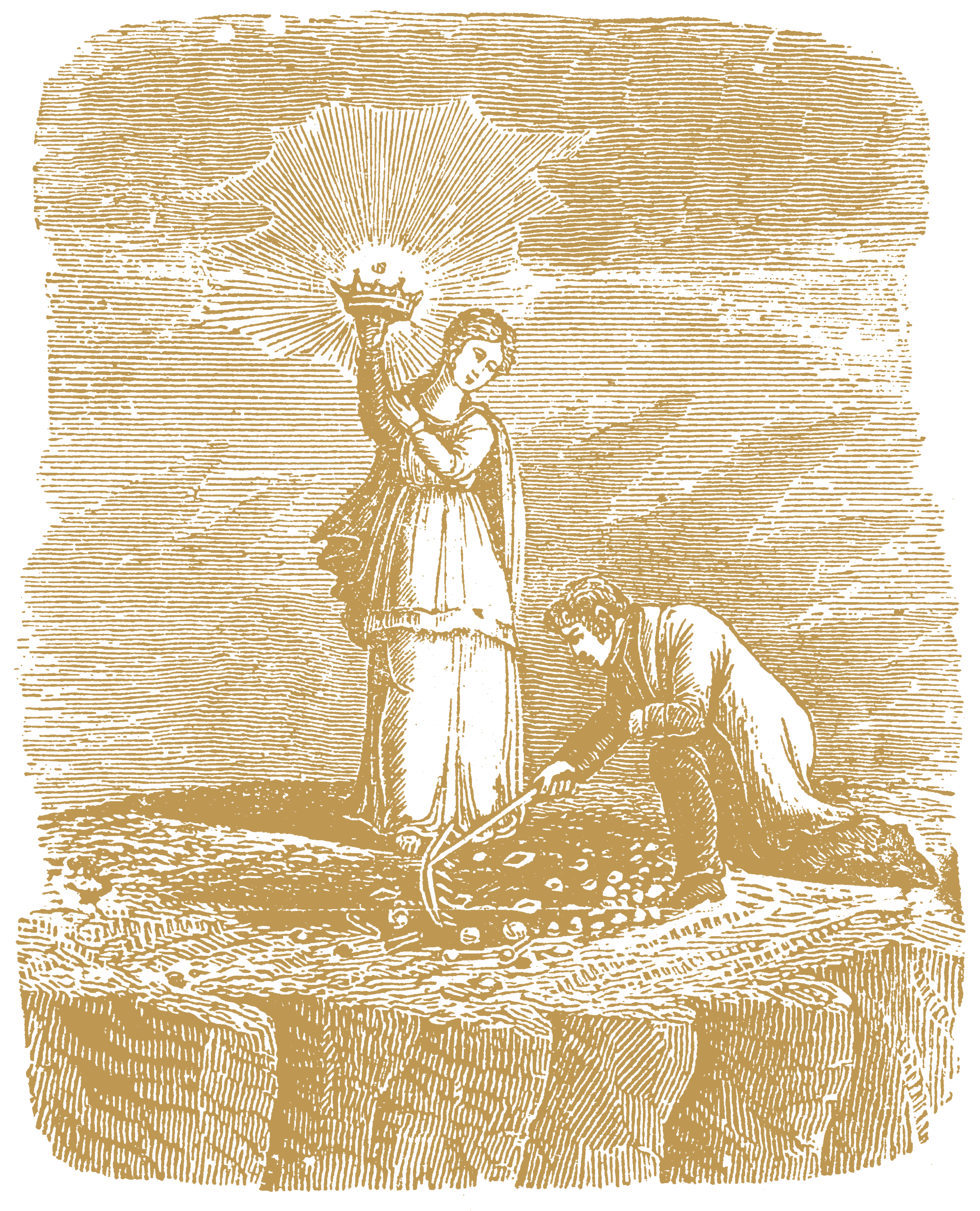The Worldling
DAY FIFTEEN
PONDER THIS ENGRAVING
MEDITATE ON THESE VERSES
1 John 2:15,16 | Matthew 16:26 | Matthew 13:22 | Psalms 39:6 | Ecclesiastes 4:8 | Jeremiah 9:23 | 1 Timothy 6:9 | Ecclesiastes 2:10,11
He heapeth up riches; and knoweth not who shall gather them. Psalms 39:6 ––A rich man shall hardly enter into the kingdom of heaven. Matthew 19:23
POETIC REFLECTION
And now, the worlding, with his gathering rake,
Performs his task, the glittering dust to take;
Devoted man! with many cares oppressed,
Gold he collects, to ease his aching breast.
The fool’s insignia he most truly bears,
He but increases what he mostly fears:
As dropsied patients, who with thirst are faint,
Drink and are dry, and strengthen their complaint.
While in this groveling, melancholy plight,
Religion comes, a messenger of light;
Mercy’s blest Angel has from heaven come down,
She meets the worlding the presents her crown;
”Behold,” she cries, “the diadem I bear,
Enriched with gems such as bright Angels wear;
Yield then to me, first lay thy muck-rake down,
Bear thy brow upward, and receive my crown.”
The worldling, stupid, toils and rakes away;
Still looking down, he rakes from day to day;
Himself his foe he lives, and greatly poor;
And dies remembered as a fool––no more
DEVOTION OF INTERPRETATION
The engraving represents a man hard at work; he holds a rake in his hand, with which he gathers dust and rubbish together. The yellow shining dust is called hold; he is altogether absorbed, lost, as it were, in his employment. He kneels down to his work; this shows his devotion to the object of his affections. For this groveling work he has forsaken all intellectual and religious pleasures, all social and domestic happiness. He is a poor man; although he has a great deal of that hard shining dust you see lying there, he is craving after more; he is in want, therefore he is poor; he is a miser, therefore he is miserable. The poor man is altogether beside himself.
The bright lovely one bearing a starry crown is Religion, daughter of the skies; she has many attendants, who are concealed at present; she has come a long way to meet the poor man; she looks upon him with compassion; she sees his miserable condition, she knows his great folly. Addressing him, she says: “Poor soul, why labor you for the dust which perisheth? Why do you spend your strength for naught? Hearken unto me and I will give you riches, more abundantly than earth can give, and lasting as eternity. Look up, poor man; behold this crown, beautiful and glorious; it contains the riches of a million of such worlds as this, and the happiness of ages upon ages; throw by your rake and be happy.” Worldling, for that is the name of the infatuated mortal, takes no notice whatever. He still continues at his task; there is no voice nor any that regard. And Religion, after waiting a long time, departs and leaves him to his folly.
They that will be rich––though by means ever so fair––fall into temptation and a snare, which drown men in perdition. Youth, beware! when men neglect to employ the talent of wealth according to the will of God, he gives them up tot the love of it, and they become fools, intoxicated with the alcohol of mammon. The worldling lives in the world as though he was never to quit it. Bound for eternity, he makes no preparation for the voyage––going to the judgment, and before a holy God––and continues unrepentant and polluted. He is treasuring up what? Gold. What else? Wrath against the day of wrath. The love of money, an evil disease, has taken hold upon him; the more he adds, the more he feeds the disease; like persons with the dropsy, who drink and are still dry. When Garrick[1], the actor, showed Dr. Johnson an estate he had lately purchased, Johnson remarked: “Ah! it is these things that make death dreadful.” But the love of money makes life miserable. The Roman citizen, Apicius, after spending some 800,000 pounds, and finding he was worth only 83,000 pounds, fearing want, ended his life by poison.
But the wordling heapeth up riches, and know not who will gather them. Cupidus, with great labor, accumulated a great estate, and dying, left his wealth to his two sons, Stultus and Effusio. Stultus had in a little time to be placed under guardians, who spent his money for their own pleasures. Effusio squandered his patrimony in riotous living, and died a most miserable death in a lunatic asylum.
Barber, John Warner, 1798-1885. Bible Looking Glass: Reflector, Companion and Guide to the Great Truths of the Sacred Scriptures, and Illustrating the Diversities of Human Character, and the Qualities of the Human Heart.
Philadelphia, Bradley, Garretson & Co., 1861

